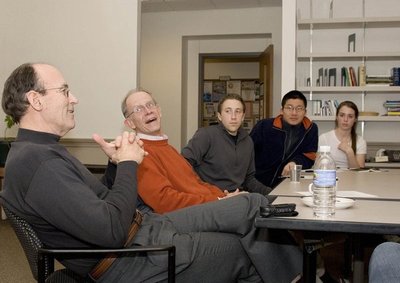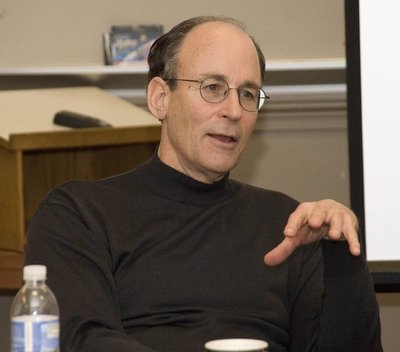March 1, 2007
‘I happened across a good story,’ Kidder says of his book about Farmer
For author Tracy Kidder, Mountains Beyond Mountains was all about a compelling story, the tale of Dr. Paul Farmer and his band of friends bent on ending world poverty both globally and one patient at a time.
“I happened across a good story, a really good story, and just wanted to tell it as well as I could. I think of myself as a storyteller, for better or worse,” Kidder told an audience of students mid-afternoon Tuesday at the UW.
One of America’s best-known nonfiction writers and a Pulitzer Prize winner, Kidder visited the Seattle campus to talk about Mountains Beyond Mountains, the inaugural choice in UW’s Common Book program, a campus-wide, year-long focus on one text.
Asked why the book has been chosen by about 40 similar programs at colleges elsewhere across the country, Kidder told KUOW Weekday host Steve Scher that today’s students live in “the most meretricious age in the history of the world,” and many students, not to mention faculty, are looking for things that have depth and meaning, ways to improve the world.
Farmer, a physician and medical anthropologist at Harvard University, founded Partners in Health, which builds and operates clinics for destitute people in places such as Haiti, Rwanda and most recently, Malawi. The work has included some of the world’s most difficult health problems, such as HIV/AIDS and multidrug-resistant tuberculosis.
Kidder, 61, initially dodged writing about Farmer. “I knew if I followed this guy around, it would disturb my peace of mind.” Farmer, he knew, would make him feel guilty about his own privileged existence.
But Farmer was compelling. Seemingly tireless, and with almost luminous joy, he was tending to the losers — people nobody wanted. Kidder would eventually spend three years following Farmer through eight countries, seeing much that shocked him, including children starving to death.
At one point, Kidder hiked 11 hours with Farmer to visit a Haitian family suffering from TB. Farmer “speaks Haitian Creole like a rat,” Kidder said. “He knows the language and the culture very deeply. He’s virtually a Haitian, even though he’s a blanc (a white person).
Haiti itself is “basically bleeding away,” a country where land has been deforested, where lack of clean water and sufficient food are ongoing crises, Kidder said. Unless something is done, he added, the country might not exist in 25 years.
Haiti presented “more reasons for despair than I’d ever seen or imagined,” said Kidder during the radio interview, “but it was also exhilarating because someone (Farmer and Partners in Health) was doing something effective about some of the worst problems in the world.”
Kidder said his stories always revolve around a person or group of people. “Nothing feels substantial until it has a live human being or several — it’s the engine of narration.”
In Mountains Beyond Mountains, he sometimes reflects on what he himself saw, mostly to temporarily divert the focus from a man who often comes off as a saint.
Kidder said he would never allow someone else to follow him as closely as he follows his subjects. Still, he added, “I try to be a good guest in these people’s lives.”
In the early evening, Kidder joined UW student Kate Baber, University Book Store book buyer Nick DiMartino, and UW assistant professor of medicine Audrey Young at Kane Hall for an on-stage conversation about Mountains Beyond Mountains.
Kidder said Farmer was shocked at how personal the story turned out, but that he and Farmer are friends. “Paul is kind, considerate, a wonderful traveling companion — and when you get sick, he takes care of you.”
Since Mountains Beyond Mountains” was finished, Partners in Health has expanded to eight hospitals and clinics in Haiti. This past year, said Kidder, those places cared for more than 1.3 million Haitians. Work continues among AIDS victims in Boston and in a Rwandan hospital. Malawi work is in early stages, and there’s talk of moving into Ethiopia.
But if Farmer’s goal is to wipe out world poverty, why doesn’t he concentrate on large-scale efforts and skip individual patients and individual concerns?
Individual patients will show you how to treat the family, the village, the country, the world, Farmer told Kidder.
But there’s another reason as well: “I don’t think Paul could go to all those (global health) meetings if he didn’t have patients,” Kidder said. “He’d end up borrowing some…it’s the foundation of his being.”
After Kidder’s evening remarks, UW junior Carrie Vincler remembered Kidder and Farmer’s assertions that the best contributions to the world are made not by people who think they should duplicate Farmer, but by those who do what they do best.
Lisa Vincler Brock, Carrie’s mother and a state Assistant Attorney General, said her book group read Mountains Beyond Mountains, and that the story reminded her why she went into public service: “I want to make a difference.”


